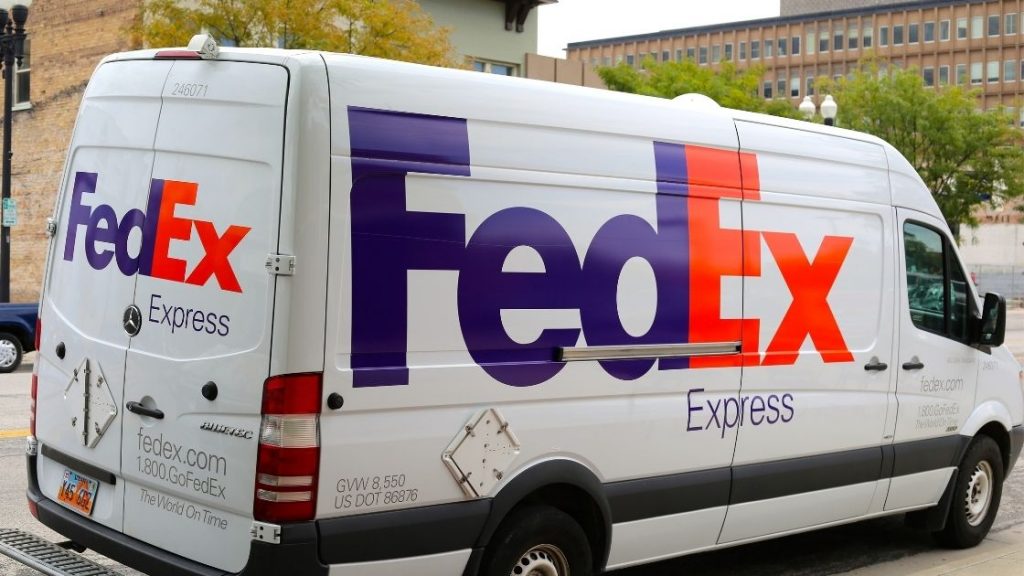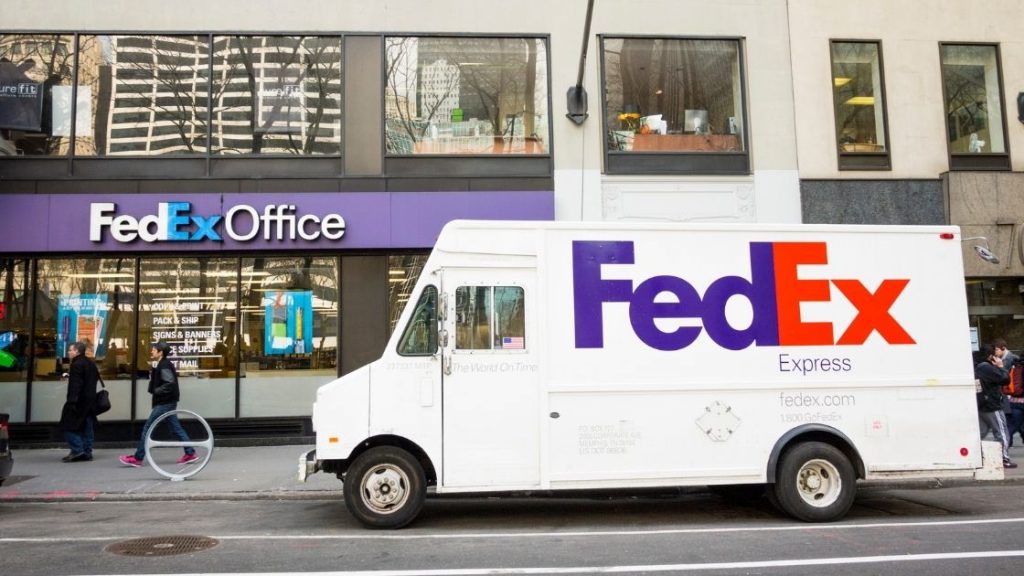Are you interested in getting into the trucking industry and starting your own trucking company, but don’t know how to get started?
I get it – it can certainly be confusing. After all, it’s not as simple as just buying a truck and making deliveries.
You have to know what type of truck you want to buy, what the legal and regulatory requirements are for transporting freight, how much your start up costs are really going to be, and whether it’s going to be profitable enough for you to make the plunge.
In this article, I am going to cover what I believe are some of the best trucking businesses you can start. To keep things organized, I will categorize these businesses based on the main types of commercial trucks out there.
That means we are going to address businesses that you can start using semi-trucks, box trucks, dump trucks, and vans.
For each of these categories of businesses, I will include essential info on that type of trucking business such as (i) start up costs; (ii) profitability; (iii) and essential things you will need (or do) to get your business off the ground.
It’s a lot to cover, so let’s get into it!
If you want to skip ahead to any vehicle category, just click on the corresponding link below.
This post may contain affiliate links. If you click on a link and complete a transaction, I may make a small commission at no extra cost to you.
The information contained in this post is for informational purposes only. It is not a recommendation to buy or invest, and it is not financial, investment, legal, or tax advice. You should seek the advice of a qualified professional before making any investment or other decisions relating to the topics covered by this article.
What is a Trucking Business?
Let’s start with the basics.
For those unfamiliar with trucking, a trucking business is simply a business that delivers items or people for profit using some type of larger commercial vehicle (namely, a truck).
Some trucks are better suited to transport cargo while others are perfect for delivering groups of passengers. You should make sure you get the right truck for the type of business you want to run. Of course, we’ll cover that too.
Semi-Truck Businesses
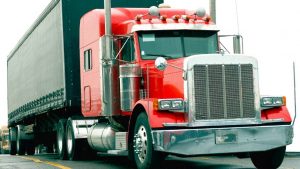
If you live in the US, you know what a semi-truck is (the picture above just about covers it, I think). They are also known as big rigs or tractor trailers (when attached to a trailer).
As you can imagine, they are large, powerful vehicles and are expensive to buy, difficult to drive, and can be dangerous if not operated properly. Because of this, the government requires that people who drive semi-trucks obtain a commercial driver’s license (CDL).
Due to their size and power, semis are used primarily to haul large shipments across long distances.
How Much Do Semis Cost?
As I mentioned, semis are expensive. A brand new one can range between $130,000 to $200,000+. If you want one with a fancy sleeper berth, it can go even higher.
In contrast, a used semi is substantially more affordable. You can get your hands on one for around $30,000 on the very low end (although it will be pretty rough shape). Even within the realm of used trucks, prices can get up there, with some high quality used semis commanding prices as high as $180,000. Source
Of course, you don’t have to buy. You can lease too.
If you are low on funds, this option can make a lot of sense. And you get the advantage of being able to scale your business more quickly because you won’t have the same down payment obligations as you would if you were buying your truck.
Plus, you will have fewer repair and maintenance headaches than if you were to buy a used semi with a lot of miles on it.
If money is tight, check out my article on how to start a trucking business with no money. It walks you through the process for financing a truck with no money, including links to potential lenders who offer 100% financing and leasing options.
How Much Money Can a Long Haul Trucking Business Make?
A long haul trucking business can be profitable if managed correctly.
I did a little research and, based on data from CTA Trucking (a long haul transportation company), the average gross income of their trucks ranges from $4,000-$10,000+.
According to them, an owner operator can make anywhere from $2000-$5000+ a week. Multiply that out by 52 weeks and you get between $104,000 – $260,000. That’s pretty good money.
What Type of Trucking Business Can I Run with a Semi-Truck?
As I implied earlier, if you are operating a semi, you’re going to want to focus on large loads (aka “FTL” or “Full Truck Load”).
Sure, you can occasionally take smaller loads as needed and when convenient, but if you want to maximize profit, the bigger and longer loads will generally pay more.
Long Haul Trucking Business
Most semi truck operators carry large loads across long distances. This is called long haul trucking (aka “over-the-road” or “OTR” trucking). When you are engaged in this type of trucking business, you semis will generally transport cargo across state lines and your routes will usually be 250 miles or more.
As you can imagine, these longer routes generally pay more.
The downside of long haul trucking is that your drivers can be on the road for extended periods. That’s going to make it tough to hire and retain good drivers over the long term. It can be done, but turnover is just a reality of this business.
You can try to keep your drivers happy by paying them well, treating them fairly and giving them comfortable and safe trucks. One option to consider is getting a semi with a decent sleeping area.
These areas are called sleeper cabs or sleeper berths and they can be a great option to increase productivity, profitability and morale. Check out my article on sleeper cabs here if you want to learn more.
If you prefer to start a trucking business by being a driver, you can do that as well. Most trucking company owners probably started this way. To do this, you will need at CDL, your own trucking authority, and you’ll need to comply with a bunch of other legal and regulatory requirements.
Here are some key things to consider when doing this:
Trucking Authority: You’ll need a Motor Carrier Number. Apply to the Federal Motor Carrier Safety Administration (FMCSA) for this.
Insurance and BOC-3: You’ll need to procure appropriate insurance and file a BOC-3 form. This is a form which identifies your service of process agent in the states where you operate.
UCR: If you are delivering freight across state lines you’ll need a Unified Carrier Registration (UCR). Also, if you transport across state lines and meet certain other criteria, you may need a US DOT number and an International Registration Plan (IRP).
This is just a sampling of the paperwork and filings you will need to do. It can seem daunting, but there are a lot of companies that can specialize in helping owner-operators with these compliance tasks.
Keep in mind that others have gone before you and this isn’t rocket science. A ton of folks have already gotten their own authority and started a successful trucking business starting from exactly where you are now.
Short Haul Trucking Business
If you don’t like the complexity, risk and lifestyle of long haul trucking, a short haul trucking business may be a better option for you.
They specialize in shorter routes, which are typically 150 miles or less.
It may not be as profitable as long haul trucking, but the trade-off is that you are dealing with shorter, more manageable routes, which can allow you and your drivers to make it home each night. You may also have less regulatory headaches, especially if your routes are primarily in state.
How to Get Started
If you a step by step guide to starting a trucking business with your semi, check out my article on how to start a trucking business with just one truck. It covers some of the key operational pieces including how to establish your corporate entity, how to get loads that pay well, and much more.
Box Truck Businesses
Semis are not the only game in town. If you want to start with something a little less daunting, a box truck business may be the right type of trucking business for you.
What is a Box Truck?
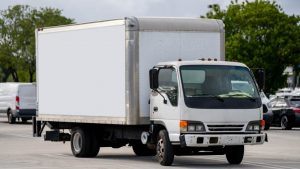
A box truck is a vehicle that has a chassis cab truck with a rectangular cargo area. It looks like a smaller version of a semi, but the cab and cargo area are fixed to each other. Box trucks range from 10–26 feet long and come in various weight ratings from Class 3 to Class 7 (12,500 lb. to 33,000 lb. gross vehicle weight rating). Source.
They often have a roll-up rear door (like a garage door) that allows to access to the cargo space. If you are familiar with a decent sized U-Haul or Penske, you know what a box truck is.
How Much Do Box Trucks Cost?
Box trucks are priced between $25,000 to $45,000 for a light duty class 2 or 3 truck that is brand new. Obviously, the larger you go, the higher the cost.
Here’s a table that show new box truck costs by weight class.
| Box Truck Size | Box Truck Price Range |
| Light duty class 2 and 3 | $25,000-$45,000 |
| Medium duty class 4 | $35,000-$50,000 |
| Medium duty class 5 | $45,000-$70,000 |
| Medium duty class 6 | $50,000-$90,000 |
If you prefer to save a few bucks, consider purchasing a used box truck. They can go for as little as $5,000 – $10,000 (I am talking trucks with a lot of miles, of course). Box trucks that are in better condition will run you more – anywhere from $10,000 – $40,000, depending on your typical factors, including mileage, age, make, model, etc.. Source.
How Much Money Can a Box Truck Business Make?
According to Ziprecruiter, The national average compensation for a box truck owner-operator is $110,275 per year, which translates to around $53 per hour.
It is important to note, however, that a lot of things can play into how much you will actually make, including the number of loads you deliver, how well you negotiate your rates, how effectively you control your costs, and even where you operate.
What Type of Trucking Business Can I Run with a Box Truck?
Box trucks are perfect for handling smaller loads (often referred to as the “less than truckload” sector). The good news is that this LTL sector has been expanding with the expansion of e-commerce.
Box trucks can be great at local deliveries. I am talking about packages, furniture, bulk food items, and similar-sized cargo. These types of jobs are perfect for box trucks because these types of trucks can easily navigate urban areas but are large enough to ship relatively large freight.
On top of that, you can drive a box truck (if you choose the right type) without a CDL.
Below is a list of businesses that you can start with just a box truck:
Moving Business
This one is self-explanatory, so I won’t get into it. Many moving companies use box trucks for local moves. You will need at least one other person to help you move items and will need to look into state and local rules around operating this business.
Local Delivery Business
Manufacturers and other businesses often need local deliveries made that require a larger vehicle, like a box truck.
Where can you go to find these types of delivery jobs? Check out places like GoShare, Lugg and Dolly
Regional Trucking Business
If you own a larger box truck capable of handling big loads, you can operate a freight transport business specializing in regional deliveries.
Box Truck Rental Business
This one is a little outside the box (no pun intended).
If you want a low key way to make money, you can rent out your truck when you are not using it. Fetch is a website that allows to you do exactly this (but your box truck must be under 12 feet in length and less than 10 years old).
If you are intrigued by this strategy, there are other ways to rent out your box truck (as well as other types of vehicles). Check out my full tutorial on How to Rent Out Your Truck For Profit to learn more.
FedEx Routes
If you have a decent amount of money set aside, you can actually buy a FedEx delivery route that uses box trucks (and other smaller vehicles) to deliver its packages.
Basically, you buy a territory and make money for each delivery made within that territory. What I like about this business is that you don’t have to worry about finding loads everyday. FedEx takes care of that headache because they give you the packages you need to deliver each day.
Owning a FedEx route can be profitable business and, if you structure it right, it can run itself. Make sure you have a competent manager and reliable drivers, and the everyday operations should run smoothly without you need to get involved.
If you want to learn more about how to do this, check out my article here.
How to Get Started
I know we got a little into the weeds here, but if you want a comprehensive, yet easy to understand overall guide to starting a box truck business, check out my tutorial here.
Dump Truck Businesses
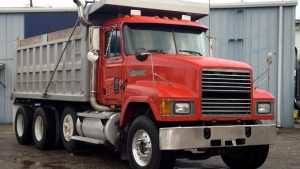
Dump trucks can be another great trucking business.
As a general matter, dump truck operators are able to come home each night, so that’s a plus. I also like the flexibility that this type of business affords. There are a lot of different loads you can handle with your dump truck, which means you can service different industries.
How Much Do Dump Truck Costs?
A brand new dump truck is pricey. They begin at around $100,000, but can be as much as $150,000. Truly higher-end dump trucks (e.g., Kenworth) can start at over $180,000. Source
As with most things, used ones are way cheaper, with prices ranging from as low as $30,000 to $100,000. Source
How Much Money Can a Dump Truck Business Make?
According to Payscale, an owner-operator of a dump truck can make somewhere around $39,000 to $200,000, with the average at $97,174.
That’s a really wide range and there are a lot of things that can impact your profits. For example, the location where you operate service matters – some areas are more suited to dump truck businesses, such as regions experiencing a boom in construction, real estate renovations, and so on.)
How to Get Started
For full step-by-step instructions on how to start a dump truck business, check out my beginner’s guide on how to start a dump truck business.
Van Businesses

Now let’s turn to vans. You have basically two options when it comes to vans: (i) cargo transport and (ii) passenger transport.
Want to deliver goods – go with a cargo van. They are ideal for delivering goods near urban areas. They are simple to drive, easy to park, and can still fit a decent amount of cargo.
Prefer to drive people around? You’ll need a passenger van instead.
Passenger vans are very similar to cargo vans in terms of price, size, drivability, and the like, but they include several rows of seats. You’ll find passenger vans used in group taxi businesses or bus charter companies.
They are often utilized for “shared ride” passengers who are going to (or coming home from) the airport.
We’ll talk about both types of vehicles and the various businesses that you can start with each of them.
How Much Do Vans Cost?
Cargo Vans
According to Truecar, new cargo vans run between $25,000-$35,000. Source
As you can imagine, buying a used cargo van is going to save you a lot of money. I looked at used cargo vans on Edmunds and found ones starting as low as $2,500 (although I also saw some that ran well over $50,000 – for almost-new Mercedes cargo vans).
Passenger Vans
According to Truecar, new passenger vans run between $28,000-$43,000. Source
Just like with cargo vans, buying a used passenger van is going to be much cheaper. I looked at used passenger vans on Edmunds and found ones starting slightly under $2,000 (although they can run well over $50,000).
How Much Money Can a Van Transport Business Make?
A van business can be profitable. The average owner-operator of a van business in the U.S. makes around $98,660 per year, according to Ziprecruiter. This is almost double the national median income.
Of course, in business, nothing is guaranteed.
The actual amount you make may vary depending on where you operate, what type of transportation business you are in (cargo or passenger), how much you charge, how well you manage your expenses, how skilled you are at marketing, and a host of other factors.
What Types of Businesses Can I Start with a Van?
Cargo Van Businesses
Deliver Retail Goods
Similar to a box truck, you can make local deliveries with your cargo van. As we mentioned earlier, explore GoShare and connect with folks looking for people to handle these sorts of deliveries.
Deliver Furniture (Or Offer Moving Services)
You can also use your cargo van to deliver smaller items of furniture. Now you are not going to be transporting grand pianos, but a sofa and some tables? No problem. You can target apartment moves, or small office relocations. Check out places like Taskrabbit, Thumbtack, and similar sites.
Deliver Flowers
Most larger florists own their own delivery cans, but not all of them. And in some cases, they don’t want to deal with the hassle of managing their own drivers and figuring out routes, etc. Especially on busy days.
I used to own a florist, so I feel the pain there.
That’s where you can come in. If you offer a reliable flower delivery solution and do it for a good price, you can be a really attractive option.
Rent Out Your Cargo Van
Like with box trucks, you can rent out your cargo van. As mentioned before, check out Fetch Fetch as a starting point.
E-Commerce Driver
You can become a cargo van operator for companies like Amazon. There should be no shortage of loads and you are partnering with one of the biggest and best brands in the world.
If you want to learn more, check out Amazon Flex. They aren’t available everywhere yet, but there you’ll find fairly wide availability around the country even now.
Passenger Van Businesses
Offer a Car Service
This is the simplest business you can start with a passenger van.
As I stated earlier, you can offer shared ride services, charter van services, shuttle van services, and many other variations on these types of passenger delivery services.
Rent Out Your Passenger Van
We’ve talked about renting vehicles before, but the resource you use for passenger vans is different. For this type of vehicle, check out Turo.com.
They are like the Airbnb of car rentals. They have a cool little tool called the Carculator, which estimates how much you can make renting out your vehicle.
For a 2018 Ford Transit Van, it spit out that I could make over a $1,000 a month!
How to Get Started
If you are interested in learning more about cargo van businesses and how you can actually get started, check out my complete guide here.
Conclusion
So there you have it – 20+ great trucking businesses that you can start. Hope you found it helpful and best of luck on your trucking business journey.
